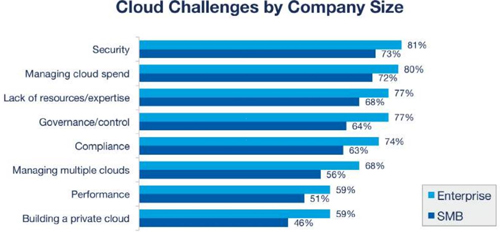News
Report: Azure Has Edge over AWS Among Cloud Newcomers
A recent report from RightScale Inc. sheds further light on the contest between cloud market leader Amazon Web Services (AWS) and its closest competitor, Microsoft Azure.
RightScale's "2018 State of the Cloud Report" confirms an emerging trend in the cloud market: While Azure still has a lot of ground to make up before it can catch AWS, it is steadily making inroads. "Among enterprises, Azure grew enterprise adoption strongly to 58 percent, gaining ground on AWS at 68 percent," RightScale said.
"Among enterprises just beginning their cloud journey, Azure is used by 49 percent while AWS is at 47 percent," the firm added. "Azure also saw strong growth in the footprint of virtual machines used by its customers: 44 percent of Azure users have more than 50 VMs (up from 32 percent in 2017), while 59 percent of AWS users have more than 50 VMs (up from 51 percent in 2017)."
Across the board, public cloud adoption is still climbing. "Adoption of public cloud grew for all cloud providers," RightScale said. "Across all users, AWS increased adoption from 57 percent in 2017 to 64 percent in 2018; Azure increased from 34 to 45 percent; Google Cloud increased from 15 to 18 percent; IBM Cloud increased from 8 to 10 percent; VMware Cloud on AWS came right out of the gate strongly with 8 percent adoption; Oracle Cloud increased from 3 to 6 percent; and Alibaba Cloud showed 2 percent adoption in its first year being included in the survey."
The point about Alibaba's ascendance is a relatively new development. In a separate survey published earlier this month, Synergy Research Group saw Alibaba break into the cloud market's Top 5 for the first time in late 2017.
Other data points of interest reported by RightScale include:
- The vast majority of respondents (96 percent) now use cloud.
- More than eight in 10 respondents have a multicloud strategy.
- Organizations leverage almost five clouds on average.
- Enterprise cloud spend is significant and growing quickly.
- Companies run a majority of workloads in cloud.
- Significant wasted cloud spend drives users to focus on costs.
- Container use is up: Docker is used most broadly while Kubernetes grows quickly.
- Use of configuration tools grows, with Ansible showing strongest growth.
- Top cloud challenges in 2018 are security and spend.
Regarding the last point about challenges, security continues to be a top-of-mind concern, especially in light of last year's spate of reports detailing wide-open, unencrypted cloud data stores leading to ransomware attacks and more.
 [Click on image for larger view.] (Source: RightScale)
[Click on image for larger view.] (Source: RightScale)
Speaking of security and other challenges, the report revealed:
- Security is a challenge for 77 percent of respondents, while 29 percent see it as a significant challenge.
- Managing cloud spend is a challenge for 76 percent of respondents, while a smaller 21 percent see it as a significant challenge.
- Security is the largest issue among cloud beginners, while cost becomes a bigger challenge for intermediate and advanced users.
- Enterprises cite more challenges across the board than SMBs.
Somewhat incongruously, however, security is seemingly getting less attention from enterprise IT departments, as they have cited security at a decreasing percentage for the past three years. "Even among enterprise central IT teams, who typically have the most responsibility for security, there has been a significant decline in security concerns among this group over the last few years, declining further to 32 percent in 2018," RightScale said.
RightScale's annual report was conducted last month, garnering responses from 997 technical executives, managers and practitioners across a range of industries from organizations of many different sizes.
RightScale summed up its findings thusly: "The RightScale 2018 State of the Cloud Survey showed that enterprise cloud spending will grow rapidly over the next year, and yet 35 percent of cloud spend is wasted. As a result, optimizing clouds costs is the top initiative for cloud users in 2018," said CEO Michael Crandell. "Multi-cloud continues to be the preferred strategy for enterprises, with companies reporting that they use nearly five different clouds on average. With this multi-cloud approach, Azure is now nipping at AWS' heels and, in fact, is in a dead heat with AWS among enterprises that are just beginning their cloud adoption."
About the Author
David Ramel is an editor and writer at Converge 360.